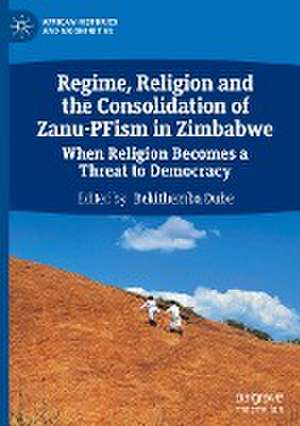Regime, Religion and the Consolidation of Zanu-PFism in Zimbabwe: When Religion Becomes a Threat to Democracy: African Histories and Modernities
Editat de Bekithemba Dubeen Limba Engleză Hardback – 15 dec 2023
Din seria African Histories and Modernities
- 15%
 Preț: 695.01 lei
Preț: 695.01 lei - 20%
 Preț: 815.67 lei
Preț: 815.67 lei - 15%
 Preț: 577.54 lei
Preț: 577.54 lei - 15%
 Preț: 587.85 lei
Preț: 587.85 lei - 15%
 Preț: 642.51 lei
Preț: 642.51 lei - 18%
 Preț: 733.33 lei
Preț: 733.33 lei - 18%
 Preț: 734.27 lei
Preț: 734.27 lei -
 Preț: 384.09 lei
Preț: 384.09 lei - 18%
 Preț: 739.31 lei
Preț: 739.31 lei -
 Preț: 418.45 lei
Preț: 418.45 lei - 15%
 Preț: 694.69 lei
Preț: 694.69 lei - 9%
 Preț: 753.50 lei
Preț: 753.50 lei - 15%
 Preț: 641.71 lei
Preț: 641.71 lei - 15%
 Preț: 704.17 lei
Preț: 704.17 lei - 18%
 Preț: 733.33 lei
Preț: 733.33 lei - 15%
 Preț: 703.38 lei
Preț: 703.38 lei - 15%
 Preț: 527.32 lei
Preț: 527.32 lei - 15%
 Preț: 698.94 lei
Preț: 698.94 lei -
 Preț: 485.61 lei
Preț: 485.61 lei -
 Preț: 386.99 lei
Preț: 386.99 lei - 15%
 Preț: 704.87 lei
Preț: 704.87 lei - 18%
 Preț: 781.45 lei
Preț: 781.45 lei - 18%
 Preț: 894.97 lei
Preț: 894.97 lei - 15%
 Preț: 641.16 lei
Preț: 641.16 lei - 15%
 Preț: 643.16 lei
Preț: 643.16 lei - 18%
 Preț: 783.20 lei
Preț: 783.20 lei - 15%
 Preț: 643.00 lei
Preț: 643.00 lei - 18%
 Preț: 900.49 lei
Preț: 900.49 lei - 15%
 Preț: 699.59 lei
Preț: 699.59 lei - 15%
 Preț: 644.49 lei
Preț: 644.49 lei - 15%
 Preț: 587.53 lei
Preț: 587.53 lei - 15%
 Preț: 703.06 lei
Preț: 703.06 lei - 15%
 Preț: 587.39 lei
Preț: 587.39 lei - 15%
 Preț: 582.63 lei
Preț: 582.63 lei - 15%
 Preț: 586.88 lei
Preț: 586.88 lei -
 Preț: 385.47 lei
Preț: 385.47 lei - 15%
 Preț: 703.71 lei
Preț: 703.71 lei - 18%
 Preț: 744.22 lei
Preț: 744.22 lei - 15%
 Preț: 590.95 lei
Preț: 590.95 lei - 15%
 Preț: 587.53 lei
Preț: 587.53 lei
Preț: 781.62 lei
Preț vechi: 953.20 lei
-18% Nou
Puncte Express: 1172
Preț estimativ în valută:
149.56€ • 156.15$ • 123.78£
149.56€ • 156.15$ • 123.78£
Carte tipărită la comandă
Livrare economică 05-19 aprilie
Preluare comenzi: 021 569.72.76
Specificații
ISBN-13: 9783031460838
ISBN-10: 3031460839
Pagini: 220
Ilustrații: XIII, 220 p.
Dimensiuni: 148 x 210 mm
Greutate: 0.43 kg
Ediția:1st ed. 2023
Editura: Springer Nature Switzerland
Colecția Palgrave Macmillan
Seria African Histories and Modernities
Locul publicării:Cham, Switzerland
ISBN-10: 3031460839
Pagini: 220
Ilustrații: XIII, 220 p.
Dimensiuni: 148 x 210 mm
Greutate: 0.43 kg
Ediția:1st ed. 2023
Editura: Springer Nature Switzerland
Colecția Palgrave Macmillan
Seria African Histories and Modernities
Locul publicării:Cham, Switzerland
Cuprins
1. Zanu-PFism due to Stockholm Syndrome, and its Trajectories in Post-Independence Zimbabwe. Juxtaposing the Role of Religion in Thwarting Democracy.- 2. Mixing up Priorities? Propagation of Uncritical Patriotism of Zanu-PF by the Church in Zimbabwe.- 3. The (Catholic) Church and Resistance to Zanu-PFism in Zimbabwe.- 4. God or President Emmerson Mnangagwa? Romans 13:1–7 in Zimbabwe’s Contemporary Church and Election.- 5. Adventist Silence in the Face of Oppression as a Way to Enact Zanu-PFism in Zimbabwe.- 6. Hearing the Loud Voices of the Silent Church in Zimbabwe.- 7. Man of God/Gold and Zanu-PFism in Zimbabwe: The Case of Makandiwa and Angel.- 8. A Critical Evaluation of Bishop Ancelimo Magaya’s Resistance to Zanu-PFism in Zimbabwe.- 9. CCCism vs. Zanu-PFism: Religious Response of the Citizens Coalition for Change to the Zanu-PF.- 10. Religion and the Consolidation of the Zanu-PF Political Ideology.
Notă biografică
Bekithemba Dube is a research Professor at Central University of Technology, Welkom Campus, South Africa.
Textul de pe ultima copertă
This collection focuses on the role of religious leaders and religious institutions in supporting or resisting the democratization process in Zimbabwe. It scrutinizes the actions of religious leaders such Andrew Wutawunashe and Jeremiah Mutendi who were prominent in the political scene and participated as enablers of the undemocratic regime. The contributors to this volume employ a variety of methodological approaches to understand the operational dilemma of the second republic under Emmerson Dambudzo Mnangagwa, commonly referred to as Zanupfism. It is an empirical study to determine the impact of religious leaders as regime enablers and assess the effects of such an approach in terms of social development, democracy, and social transformation as espoused in the rise of the second republic. In order to balance the narrative, the book highlights and offers critique of religious leaders and institutes who are the resistors of the regime. It specifically explores the Zimbabwe Catholic Bishops Conference, Evangelical Fellowship of Zimbabwe, Zimbabwe Council of Churches, Talent Chiwenga and Shingi Munyeza. This is a critical study of decoloniality in a religious context that documents characters such as Shingi Mayeza, Bishop Mutendi, Mapostori who seldomly appear in scholarship despite their great impact (either positive or negative) on the lives of the people of Zimbabwe.
Bekithemba Dube is a research Professor at Central University of Technology, Welkom Campus, South Africa.
Caracteristici
Is a must read for students and research in the field sociology, politics and religion in post colonial state Offers a critical approach on religion drawing mainly from various religious leaders and prophets in Zimbabwe Explains zanupfism as a system of oppression and governance in post colonial Zimbabwe
